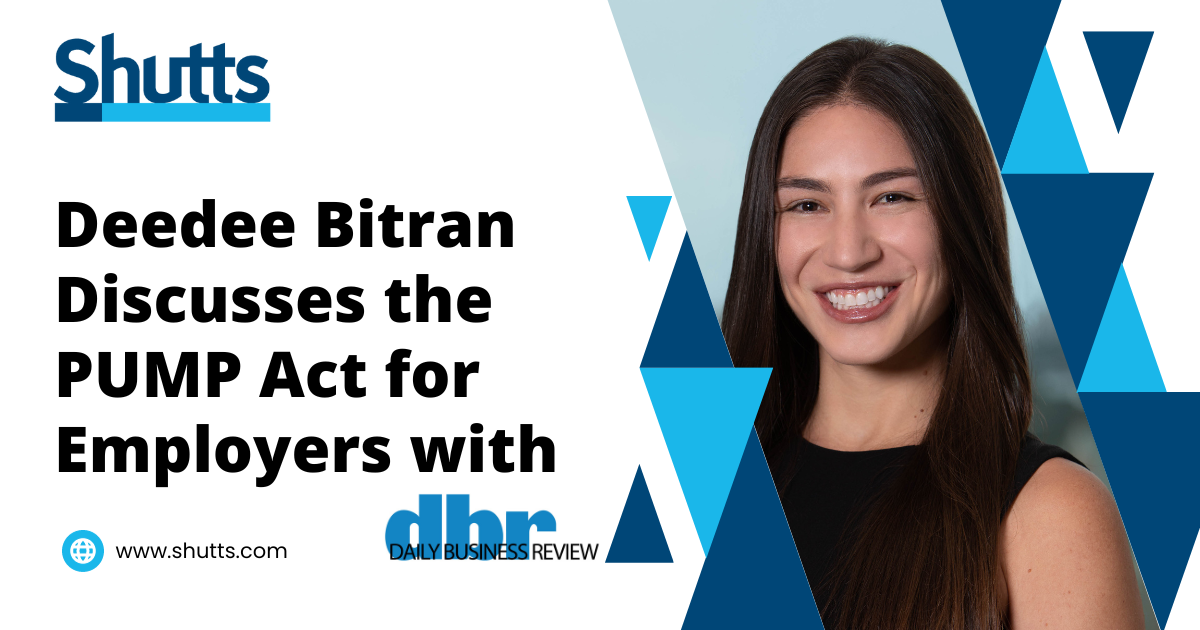
This article appeared in the Daily Business Review on October 24, 2023.
Commentary provided by Deedee Bitran.
PUMP Act: New Law that Should be on Every Employer’s Radar
The PUMP for Nursing Mothers Act (the “PUMP Act”), effective April 2023, amended the Fair Labor Standards Act (“FLSA”) and requires employers to provide reasonable break time and a location for employees to express breast milk for one year after the employee’s birth of a child.
Why should the PUMP Act be on every employer’s radar?
The PUMP Act should be on every employer’s radar because under the FLSA, a PUMP Act violation may result in, among other remedies, payment of lost wages, liquidated damages (a recovery equal to two times the underlying unpaid wages), and punitive damages. These remedies are available for a PUMP Act violation regardless of whether the employee also experienced retaliation.
How many breaks can a nursing employee take?
The PUMP Act mandates that each nursing employee be permitted to take a reasonable break each time the nursing employee has a need to express milk for one year after the employee’s birth of a child. There is no maximum number of reasonable breaks and a nursing employee is entitled to take as many as she needs that day to express milk.
Are the pumping breaks paid?
The PUMP Act entitles nursing employees to reasonable unpaid breaks. However, if the nursing employee is not completely relieved from her work obligations during that break (i.e., she brings her laptop with her and works while she is pumping, or participates on a client call while pumping), then the break must be paid.
What if my company is small and providing these unpaid breaks burdens my company’s operations?
A company with less than 50 total employees can be exempt from the PUMP Act's provisions if the company can show that complying with the PUMP Act would impose an undue hardship.
What kind of space is required?
The PUMP Act requires employers provide nursing employees with a space that is shielded from view and specifically states that such a space cannot be a bathroom. Employers are not obligated to maintain a permanent dedicated space for nursing mothers, thus, the space can be temporarily created for use when needed by nursing mothers. While the PUMP Act does not provide specifics for what features or amenities are required in the space, the Wage and Hour Division explained that the location must be functional as a space for expressing breast milk, and noted that a place to sit, a surface on which to place the pump, and access to electricity increases the functionality of the space.
How Does the PUMP Act Affect Remote Workers?
The Pump Act applies to remote workers. When pumping, a remote employee has a right to be shielded from view (this includes turning off all cameras and microphones) during a break to pump milk. The same rules apply to remote employees as if they were in the office in terms of having to compensate a remote employee for a break taken to pump milk if the employee is not entirely relieved of her job duties during that pumping break.
Does Florida have a state counterpart to the PUMP Act?
Some states have enacted state counterparts to the PUMP Act, however, as of now, Florida does not have a state counterpart. Nonetheless, Florida employers are still required to comply with the PUMP Act unless otherwise exempt. In line with the policies behind the enactment of the PUMP Act and the growing trend of states implementing local laws similar to the PUMP Act, the Florida legislature passed SB 144 this year, which requires each county courthouse to provide at least one lactation space for the public by January 1, 2024.
What should employers do?
Employers should be proactive. It is critical that employers ensure they have a compliant space on site for use when needed, as well as train management and human resources personnel on how to properly respond to PUMP Act requests. Employers should carefully review and revise their policies and handbooks to ensure compliance and provide a streamlined process for employees to request to use the space. Lastly, employers should promptly consult their employment law counsel for advice on how to properly implement these policies and on how to navigate any related issues stemming from such compliance.
About Deedee Bitran
Alamea Deedee Bitran is an attorney in the Fort Lauderdale office of Shutts & Bowen, where she is a member of the Business Litigation Practice Group. Deedee represents employers, business owners, lenders, purchasers and developers. While in law school, she served as a Judicial Intern to the Honorable Ivan F. Fernandez in the Third District Court of Appeal, as a member of the appellate moot court team, and as an Articles Editor on the FIU Law Review. She also served as a Legal Research Assistant to Professor Kerri Stone, where she researched and contributed to articles on employment discrimination and harassment.
